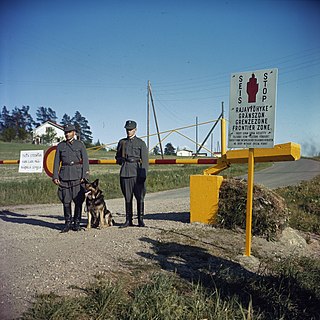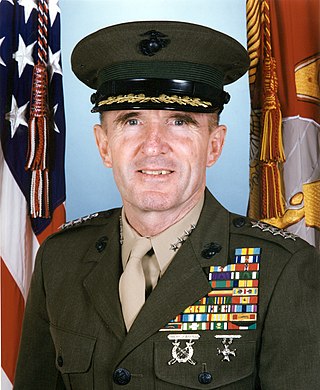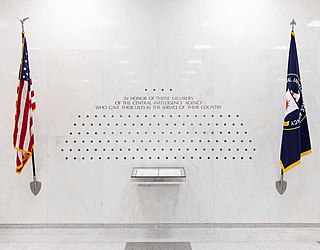
The U.S. Military Assistance Command, Vietnam (MACV) was a joint-service command of the United States Department of Defense, composed of forces from the United States Army, United States Navy, and United States Air Force, as well as their respective special operations forces.

A long-range reconnaissance patrol, or LRRP, is a small, well-armed reconnaissance team that patrols deep in enemy-held territory.

The Special Activities Center (SAC) is a division of the United States Central Intelligence Agency responsible for covert and paramilitary operations. The unit was named Special Activities Division (SAD) prior to 2015. Within SAC there are two separate groups: SAC/SOG for tactical paramilitary operations and SAC/PAG for covert political action.
Anthony Alexander Poshepny, known as Tony Poe, was a CIA Paramilitary Operations Officer in what became the Special Activities Division. He was known for controversial actions during his service in Laos with Special Guerilla Units (SGUs) under the command of General Vang Pao, a U.S.-funded secret army in Laos during the Vietnam War, and is recognized as the possible primary inspiration for Colonel Kurtz in the movie Apocalypse Now.

Jungle warfare or woodland warfare is warfare in forests, jungles, or similar environments. The term encompasses military operations affected by the terrain, climate, vegetation, and wildlife of densely-wooded areas, as well as the strategies and tactics used by military forces in these situations and environments.

The Directorate of Operations (DO), less formally called the Clandestine Service, is a component of the US Central Intelligence Agency. It was known as the Directorate of Plans from 1951 to 1973; as the Directorate of Operations from 1973 to 2005; and as the National Clandestine Service (NCS) from 2005 to 2015.
J. Vinton "Vint" Lawrence was an artist and U.S. Central Intelligence Agency paramilitary officer from their elite Special Activities Division. Under the name of "James Vinton", he was stationed in Laos from 1962 to 1966 and had a close relationship with the Hmong leader Vang Pao in the U.S. war in Southeast Asia. Lawrence's CIA colleague in Laos was the CIA paramilitary expert Anthony Poshepny.

A border guard of a country is a national security agency that ensures border security. Some of the national border guard agencies also perform coast guard and rescue service duties.

The Intelligence Star is an award given by the Central Intelligence Agency to its officers for "voluntary acts of courage performed under hazardous conditions or for outstanding achievements or services rendered with distinction under conditions of grave risk". The award citation is from the Director of the Central Intelligence Agency and specifically cites actions of "extraordinary heroism". It is the third-highest award given by the Central Intelligence Agency, behind the Distinguished Intelligence Cross and Distinguished Intelligence Medal, and is analogous to the Silver Star, the US military award for extraordinary heroism in combat. Only a few dozen people have received this award, making it one of the rarest valor awards awarded by the US government.

The Army Strategic Reserve Command is a combined-arms formation of the Indonesian Army. Kostrad is a Corps level command which has up to 35,000 troops. It also supervises operational readiness among all commands and conducts defence and security operations at the strategic level in accordance with policies under the command of the commander of the Indonesian National Armed Forces. In contrast to its name ("Reserve"), Kostrad is the main warfare combat unit of the Indonesian Army. While Kopassus is the elite-special forces of the Indonesian Army, Kostrad as "Komando Utama Operasi" or "Principal Operational Command" still maintains as the first-line combat formation of the Indonesian National Armed Forces along with the Kopassus.

The Central Intelligence Agency, known informally as the Agency, metonymously as Langley and historically as the Company, is a civilian foreign intelligence service of the federal government of the United States tasked with gathering, processing, and analyzing national security information from around the world, primarily through the use of human intelligence (HUMINT) and conducting covert action through its Directorate of Operations. The agency is headquartered in the George Bush Center for Intelligence in Langley, Virginia.

Farm Gate was the code name for a United States Air Force (USAF) mission operating in Vietnam before the overt US entry into the Vietnam War.

Richard Irving "Butch" Neal was a United States Marine Corps four-star general who served as Assistant Commandant of the Marine Corps (ACMC) from 1996 to 1998.
National governments deal in both intelligence and military special operations functions that either should be completely secret, or simply cannot be linked to the sponsor. It is a continuing and unsolved question for governments whether clandestine intelligence collection and covert action should be under the same agency. The arguments for doing so include having centralized functions for monitoring covert action and clandestine HUMINT and making sure they do not conflict, as well as avoiding duplication in common services such as cover identity support, counterespionage, and secret communications. The arguments against doing so suggest that the management of the two activities takes a quite different mindset and skills, in part because clandestine collection almost always is on a slower timeline than covert action.

The 1959 to 1963 phase of the Vietnam War started after the North Vietnamese had made a firm decision to commit to a military intervention in the guerrilla war in the South Vietnam, a buildup phase began, between the 1959 North Vietnamese decision and the Gulf of Tonkin Incident, which led to a major US escalation of its involvement. Vietnamese communists saw this as a second phase of their revolution, the US now substituting for the French.
Captain Wilbur Murray "Will" Greene was from a small town in South Carolina. Greene first served commendably in the U.S. Special Forces, learning Vietnamese while serving in the Vietnam War and the Korean War. He retired after 20 years (1947–1967) to begin a new career as a Paramilitary Officer in the Special Activities Division of the Central Intelligence Agency (CIA).
Thomas George Fosmire joined the Central Intelligence Agency's Special Operations Group of Special Activities Division as a Paramilitary Officer in the 1950s and was given responsibility in training Tibetan tribesmen to fight against the Chinese Communists in the early part of his career. The training occurred first at a base on Saipan in the Marianas islands but was later moved to a colder mountainous climate at Camp Hale, Colorado. One battalion was trained at Camp Peary, near Williamsburg, Virginia. After the Tibetan operation concluded, Fosmire landed with Tony Poe in Sumatra, Indonesia to supply and train mutinous forces there in an effort by the Eisenhower administration to destabilize the non-aligned regime of Sukarno. He and Poe were evacuated from Sumatra by US Navy submarine when the troops they were training fled to the mountains. In the late 1960s and early 70s he served in Laos and South Vietnam during the Vietnam War. In the 1980s, Fosmire served in El Salvador and Honduras, training Nicaraguan rebel troops opposed to the Sandanista government. Fosmire was twice awarded the Intelligence Medal of Merit.
Lloyd C. "Pat" Landry was a Paramilitary Officer in the Special Activities Division of the Central Intelligence Agency during the 1950s up until the 1970s.

The United States Central Intelligence Agency (CIA) dates from September 18, 1947, when President Harry S. Truman signed the National Security Act of 1947 into law. A major impetus that has been cited over the years for the creation of the CIA was the unforeseen attack on Pearl Harbor, but whatever Pearl Harbor's role, at the close of World War II government circles identified a need for a group to coordinate government intelligence efforts, and the Federal Bureau of Investigation (FBI), the State Department, the War Department, and even the Post Office were all jockeying for that new power.











